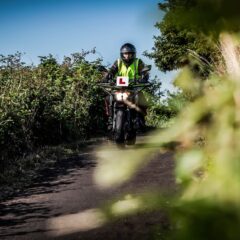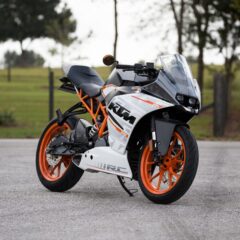
7 Top Motorcycle Accessories
With Christmas just around the corner, you might be wondering what to get your favourite motorcycle enthusiast or even a little something for yoursel...
 Phoenix Motorcycle Training LTD
Phoenix Motorcycle Training LTD
 Phoenix Motorcycle Training LTD
Phoenix Motorcycle Training LTD

There are quite a few steps to learning to ride a motorcycle before you can get a full licence. This improves safety and ensures riders are fully prepared for UK traffic conditions. After gaining your CBT certification, you’ll need to pass two practical and one theory test before you get a full licence. Motorcycle training mod 1 prepares you for the first practical test.
Mod 1 skills are the off-road abilities of a motorcyclist. Knowing how to handle your bike from standing to manoeuvering it to the road is just as important as riding on the road. In this blog, we’ll cover what you’ll learn in motorcycle training mod 1, what to expect in your mod 1 test, and a few tips for nailing your mod 1 test on the first try.
Your module 1 training and test will cover off-road motorcycle manoeuvres. It’s all about low-speed bike control. You can expect to practice low-speed skills such as wheeling your motorcycle or scooter, U-turns and slalom riding. Motorcycle training mod 1 begins with lower speeds and you’ll gradually increase to the minimum test speed for these manoeuvers as your training progresses.
The early parts of DAS training cover mod 1 skills. However, you’ll return to these over the course of your lessons to help embed the knowledge and build your muscle memory. Handling a motorcycle or scooter at low speeds is different to the skills needed when riding faster. Your motorcycle and scooter can feel heavier when moving slowly. The angles, pressure and steering techniques learned in motorcycle training mod 1 are a little different to those needed for mod 2 and riding on the road.
The module 1 test for motorcycle licences in the UK is simply the first of two practical tests. Logically, your mod 1 test covers off-road skills and manoeuvers. Mod 2 testing is on-road and in live traffic conditions.
Motorcycle training mod 1 skills are developed before heading onto the road. You’ll cover slow riding, figure of eights, putting your motorcycle on and off the stand and emergency stopping in the initial part of your motorcycle training. Developing these low-speed skills improves your confidence and ability before you ride on public roads.
Motorcyclists must pass their mod 1 tests before they can attempt their mod 2. You develop both mod 1 and mod 2 skills through full licence motorcycle training. Great motorcycle training schools book motorcycle tests as close to the end of your training as possible. This ensures your lessons are fresh in your mind when you take your tests.
The mod 1 test takes around 20 minutes and the pass certificate is valid until the expiry of your theory test certificate. You’ll need to pass your mod 2 practical test within that period to avoid needing to re-take the mod 1 test. If you fail your mod 1 test, you’ll have to wait 3 clear working days before trying again and then moving on to the mod 2 test.
Some motorcycle training centres will include the cost of your Mod 1 test in their training fees. At Phoenix Motorcycle Training, your course fees cover everything you need. That includes all the equipment for your training and for your test – including the right motorcycle with insurance – for motorcycle training mod 1 and mod 2 tests.
Everyone learns at a different rate. Motorcycle training that prepares you for the highest tier of motorcycle licence for your age usually takes 3 – 5 days. Most people spend around 3 to 4 hours on mod 1 skills. You may need a little longer to perfect some skills. It completely depends on you.
You’ll cover on and off-road motorcycle skills throughout full licence training. Motorcycle training for a full licence equips you with the skills you need to pass both mod 1 and mod 2 elements of the practical tests. You’ll need to study the highway code and road signs to pass the theory test, although these are discussed in your practice tests too.
You’ll need to work together with your motorcycle instructor to get the most out of your training and prepare you for the mod 1 and 2 motorcycle tests. Think of motorcycle training as a partnership between you, the student, and your instructor. There are a few things you can do to prepare for a great training session and get the most value from your course.
Tip #1 Before you start your motorcycle training mod 1 and 2, get a good night’s rest. Learning new skills is much harder when you are tired. Your brain absorbs less information when you don’t have enough sleep. Your reaction times are slower too. So try to get 7 to 9 hours of quality rest on the nights before your training days.
Tip #2 It may sound obvious, but you should pay close attention to your motorcycle training instructor throughout your course. If an instruction isn’t clear, ask for clarification. Your instructor will give you feedback throughout your training, but you should also ask for help and feedback when you need it.
Tip #3 Just like any other skill, it pays to practice outside of your training time too. You can support your motorcycle training mod 1 skills by practising in an empty parking lot outside of your training time. Repetition is a key element in developing muscle memory and embedding neural pathways for new skills.
Of course, you’ll need a bike or motorcycle to practice with. But even if you’re training for a higher level licence than your current bike, repeating manoeuvers on a smaller bike helps improve your skill. It’s a little like top athletes practising their movements without holding their racquets or using a ball.

With Christmas just around the corner, you might be wondering what to get your favourite motorcycle enthusiast or even a little something for yoursel...

If you love motorcycle riding, you’ve probably daydreamed about riding a motorbike for a living. A professional racer or stunt rider is OK for some...

Getting a UK motorcycle licence can seem a complicated process. Particularly when compared to a driving licence for a car. Whether you choose the pro...
This website uses cookies to personalise content, ads, and analyse traffic, sharing data with partners who may combine it with other information. See our Privacy Policy for more information.